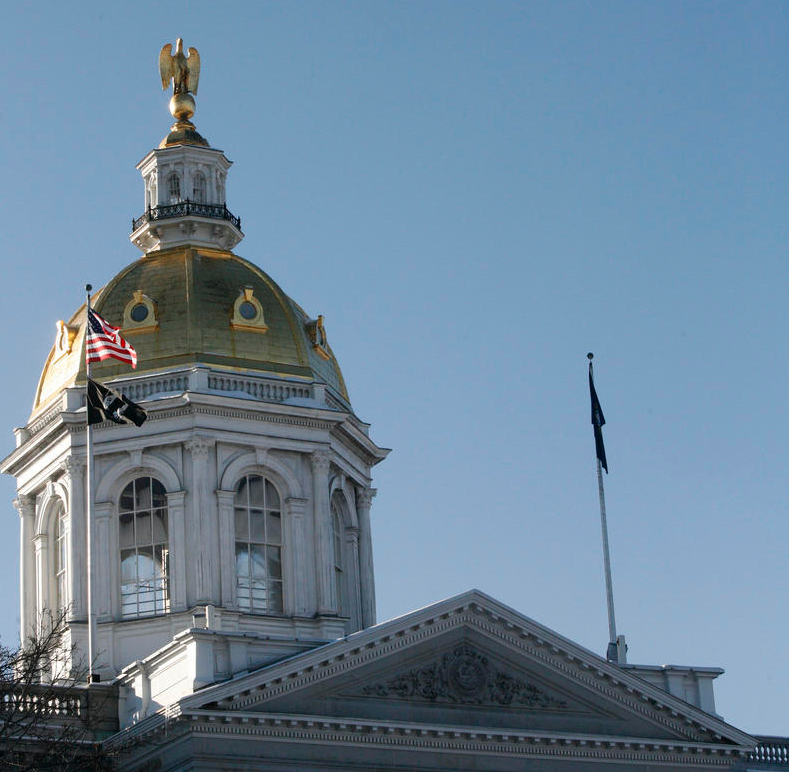By GARRY RAYNO, InDepthNH.org
CONCORD — State revenues could be $600 million to $355 million less than anticipated for the remainder of the biennium which ends June 30, 2021.
The House Ways and Means Committee worked most of the day Monday to revise the estimate in light of the COVID-19’s effect on the state and its economy.
The virus which has infected nearly 4,600 Granite Staters, killed about 250 and hospitalized 450, has done the most damage to the state’s business, rooms and meals, interest and dividends, and real estate transfer taxes.
According to the estimates of the committee, revenues for fiscal year 2020, which ends June 3, will be from $125 million to $199 million less than the $2.63 billion projected in the budget, and from $230 million to $395 million less than the fiscal 2021 estimate of $2.66 billion.
“We are dealing with tremendous uncertainty even though fiscal year 2020 is nearly at end,” said committee vice chair Rep. Richard Ames, D-Jaffrey, “there is still a great deal of uncertainty.”
Other committee members echoed the comment, and many said the pandemic is not like anything they experienced before in determining how much money the state has to spend.
Several like committee chair, Rep. Susan Almy, D-Lebanon, and former chair Rep. Norm Major, R-Plaistow, are concerned a second surge in COVID-19 infections could add to the uncertainty and impact revenues even more negatively.
Committee Democrats and Republicans caucused separately to work on their proposals, which were often similar and came to quick agreement on many revenue sources.
Business Taxes
Business taxes, which comprise about one-third of the state’s general and education funds revenue, were a sticking point, but not for long.
Making a determination on business tax revenues is complicated by an executive order from Gov. Chris Sununu deferring some businesses’ April payment to June 15.
Major noted most businesses are hurting and are keeping afloat by holding on to their cash as long as possible in order to survive. He noted that may mean some businesses skip the June deadline in order to hold their cash.
The two sides eventually agreed to a range of $650 million to $716 million for fiscal 2020, and $577 million to $655 million for fiscal 2021.
The original estimate for business taxes this fiscal year is $795.1 million and $786.1 million for 2021.
Rooms and Meals
The state’s second biggest revenue producer, the rooms and meals tax, has also been significantly impacted by the virus as restaurants and hotels were ordered closed under the governor’s stay home order, although restaurants were allowed to offer take out.
Restaurants have since been allowed to open for outdoor dining, but not inside seating.
Just how quickly the restaurants — which produce about 80 percent of the total tax — rebound played into the committee’s changes.
The two sides were very close and agreed to $321 million for fiscal 2020, and a range of $289 million to $334 million for fiscal 2021. The original estimates were $368 million for this fiscal year and $386 million for the second year of the biennium.
Interest and Dividends
The figures were close for the interest and dividends tax as well, as the committee settled on $109 million to $115 million for this year, and $88 million to $102 million for next. The original estimates are $117 million for both fiscal 2020 and 2021.
Highway Fund
The state’s Highway Fund which provides the operating revenue for the Department of Transportation, for highway safety by the State Police, and several other agencies, has also seen significant reductions due to the virus.
The fund is primarily comprised of revenue from the gas tax and vehicle registrations.
With people driving less due to the stay-at-home order, and the lack of travel from out-of-state visitors, the gas tax is expected to be about $15 million less than estimates for this fiscal year and up to $17 million less next fiscal year.
The original estimates are $130.2 million this fiscal year and $132.3 million in fiscal 2021.
Vehicle registrations and other fees are expected to be below estimates for the biennium by about $8 million.
The Highway Fund is expected to be about $40 million to $45 million less than estimates for the biennium.
Fish and Game
Unlike most other revenue streams, the Fish and Game Fund is expected to have more revenue than originally projected by about $3 million for the biennium.
Going to House
Most of the committee votes were unanimous as was the final vote to send the figures to the full House.
The new revenue estimates are expected to be voted on by the House June 11.
The new revenue estimates will give budget writers an idea of what adjustments have to be made in the two-year operating budget to bring it into balance by the end of the biennium.
Last month Sununu said he did not want to make permanent decisions on the budget adjustments until the state knows how much more money it will receive from an expected new COVID-19 relief package from the federal government.
The $1.25 billion in federal CARES Act money the state has received cannot be used to offset revenue shortfalls for the state or for cities and towns.
The next federal package is expected to provide some money to cover some of those shortfalls.
Garry Rayno may be reached at garry.rayno@yahoo.com





